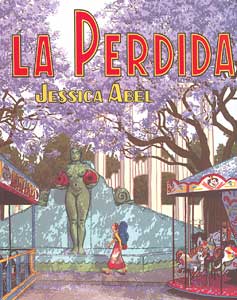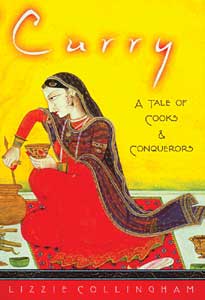![[Metroactive Books]](/books/gifs/books468.gif)
[ Books Index | Silicon Valley | Metroactive Home | Archives ]
Richard von Busack
Michael S. Gant
[ Silicon Valley | Metroactive Home | Archives ]
![]()
Book Box

La Perdida
Writing about a shallow, passive, naive character presents special problems, particularly if the character isn't witty or unintentionally funny. Abel's graphic novel concerns Carla, a Chicago-raised media—half Mexican, half American—who spends an ultimately disastrous year in Mexico City. Carla resembles the woman Jean Seberg played in Breathless: a pretty American unconscious of her potential to cause trouble. The aimless girl begins as a typical alterna-turista, a Fridaholic; she is crazed for folkloric sculptures and dazzled by the harrumphing political pronouncements of a Communist named Memo (short for Guillermo), who is about 15 years older than she is. She has affairs with a cynical Yank sniffing at the traces of the Beats (he seems to live in the apartment where William S. Burroughs played that unfortunate round of "William Tell"). Later, she takes up with Oscar, a slightly feckless slacker with dreams of being a DJ. Her aimlessness turns dangerous when the petty drug dealers around her decide for a bigger score. Everything that made Abel's comic-book 0series Artbabe so inconsequential is back, only south of the border: conversation after conversation between barely distinguishable characters, scenes of pointless gossip on telephones. Abel evinces a real ardor for cutting away from conflict, and she rarely uses the silent panel that tells all. By the time Carla finally gets into a hostage situation, it is a little too late to care. While the use of Mexico City slang is evocative (the glossary is quite worthwhile), there is not nearly enough travelogue, though the drunken trip to the Xochimilcho gardens is a highlight. (By Jessica Abel; Pantheon; 275 pages; $19.95 cloth)

Curry: A Tale of Cooks & Conquerors
Lizzie Collingham's Curry contains plenty of recipes, ranging from the delectable (green coriander chutney) to the tricky (milk punch, circa 1820, using the rinds of 30 limes and plenty of arrack), but it isn't a cookbook. Instead, Collingham treats the culinary fusions of the Indian subcontinent as a form of savory cultural history. She begins her overview with the arrival of the Mogul emperors from central Asia in the 15th century, who complained about the indigenous food and introduced a taste for game meat into a civilization for which vegetarianism was a "powerful statement of one's position in ... society." The highest flourishing of the Moguls was chicken biryani, a type of aromatic rice pilau. The Portuguese colonists brought chile peppers from the West Indies, and fiery additives become a permanent part of southern India cuisine. The Raj vacillated between a taste for tinned victuals from England and a fervent embrace of Indian curries. In a chapter on chai, the author traces the fascinating story of how tea companies, faced with surpluses in the China market, blitzed the Indians with an ad campaign that turned them into tea drinkers in the early 1900s. The book ends by following Indian expats as they opened restaurants around the world, until the British themselves declared chicken tikka masala to be the national dish of Great Britain. (By Lizzie Collingham; Oxford University Press; 315 pages; $28 cloth)
Send a letter to the editor about this story to letters@metronews.com.
From the March 8-14, 2006 issue of Metro, Silicon Valley's Weekly Newspaper.